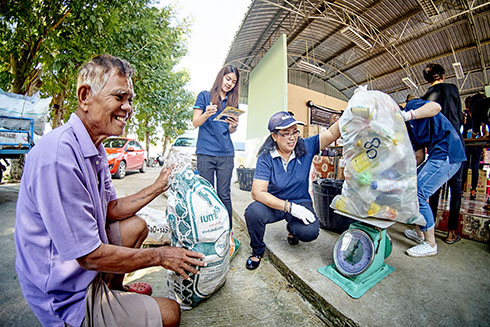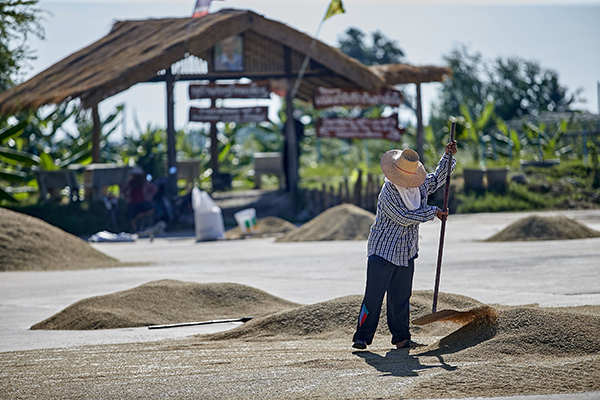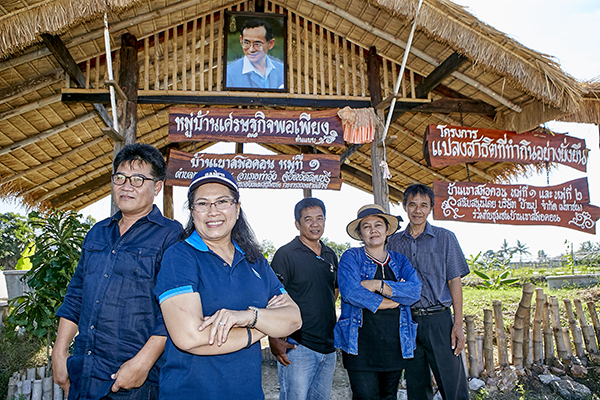Ban Khao Samorkhon in Lopburi becomes a strong model of sustainability community With support from Banpu, the community development reflects successful learning from obstacles



Ban Khao Samorkhon in Lopburi becomes a strong model of sustainability community
With support from Banpu, the community’s development reflects successful learning from obstacles
Banpu Public Company Limited, a leading Asian Energy Company with a focus on social sustainability, has reached completion of the ‘Ban Khao Samorkhon Sustainable Development Project’ after five years of activities. Following the 2011 devastating flood, Banpu implemented a pilot project at Moo 1-3, Ban Khao Samorkhon, Thawung district in Lopburi province to rehabilitate the badly affected community to become a model of community development. The activities conducted under the project helped villagers improve their agricultural processes alongside integrated agricultural plans, with its ultimate success built upon changing attitudes of villagers. Significant improvement for the community includes reduced debt burden through a fertilizer fund initiative, and improving quality of life through ‘extreme situation’ learning from flood to drought management, that has enabled the community to become a sustainable community model for others. Based on the sufficiency economy philosophy, Ban Khao Samorkhon Moo 1 was selected as one of the nine villages in Thawung district, Lopburi province to become a ‘Sufficiency Economy Village’ in ‘enough is enough’ level.
After short-term flood relief efforts were completed at Ban Khao Samorkhon in 2012 by Banpu, the collaboration continued to operate in a medium-term activities that concentrated on economic development and skill-improvement. Starting from 2013, the launch of ‘Ban Khao Samorkhon’s Farmers-For-Truth Fertilizer Fund’ was aimed as a microfinance for agriculture. The result of the activity helped lessen both the formal and informal debts of the farmers, and also provided a learning format for fund management as well as the concept of money saving. Additional activities such as Bio-Fertilizers, ‘Climbing Wattle or Cha-om’ Planting for More Income Project and waste management initiatives were also applied with strong support from the farmers.
“Banpu’s intention was to help Ban Khao Samorkhon Moo 1-3 develop into a sustainable economy, and become a model of a strong community with ongoing self-reliance. By heeding the royal initiated Developmental Principals of His Majesty King Bhumibol Adulyadej: Understand, Achieve, and Develop, Banpu began the project by discussing with the villagers about their problems and requirements since day one. Once we understand the situation and need, we helped support various skills development with learning opportunities and problem solving mechanisms through real-life situations. . These align with Banpu’s belief that ‘Learning is the Power of Change and Development’, which will lead to a sustainable development of communities. One day, when Banpu completes this project, it will help Ban Khao Samorkhon stand stronger,” said Ms. Udomlux Olarn, Head of Corporate Affairs, Banpu Public Company Limited.
A successful example of learning to find the right solution for the community given the uncontrollable factors is the ‘Khao Samorkhon Organic Sinlek Rice’ project under the long-term activities by Banpu since 2014. Sinlek Rice is known for its quality and health benefits but it’s still largely an unknown strain of rice. Due to limited awareness, there was low consumer demand, and the drought in the last two years made the situation harder. The farmers then had to adapt from organic Sinlek Rice fields to organic Jasmine rice fields in order to serve greater market needs and capitalize on eco-friendly trends.
To deal with frequent and severe drought, the farmers reduced the amount of rice fields and focused on an ‘integrated agricultural plan’, a collaboration between agricultural specialists, farmers, villagers and outside learning, to help them lessen the risk of monoculture. With this activity, they can also sell their products throughout the year in addition to household usage.
”We have gained many opportunities, with positive attitude for new knowledge, from Banpu through the ‘Ban Khao Samorkhon Sustainable Development Project’”, says Mrs. Arom Ruabruam, Moo 1 Village Head. “My family learned how to develop the non-organic fields to be organic ones. Moreover, learning on how to plant off-season limes and climbing wattles helped the villagers gain additional income. Banpu helps us to understand that sustainable development needs to start from self-management. At this time, our community has more income with fewer expenses, and we are becoming a stronger community.”
With harmony of the farmers, together with proactive push of community leader, Ban Khao Samorkhon Moo 1 was recently selected as one of the nine villages from a total of 128 villages in Thawung district, Lopburi province to be ‘Sufficiency Economy Village’ in ‘enough is enough’ level from applying the six sufficiency economy aspects: decreasing household expenditure, increasing income, money saving, learning, environment preservation and sustainable natural resource usage as well as generosity. Ban Khao Samorkhon has become a model by which other rural communities can learn from.
# # #
About Banpu Public Company Limited
BANPU is a pioneering Asian energy company, operating business in coal, power generation, and integrated energy sectors in nine countries; Thailand, Indonesia, China, Australia, Lao PDR, Mongolia, Singapore, Japan and the United States of America.
“Learning is the Power of Change and Development”
Based on our firm belief that “learning” powers constructive change and sustainable development of “people” and “society”, Banpu’s CSR activities emphasize on the promotion and development of continued “learning” among young people and communities in various forms. Banpu supports sustainable development of communities and society through a number of learning opportunities, for both individuals and teams, ranging from learning through daily real-life experiences, and learning in-and-outside of the classrooms, to hands-on practices which enhance capabilities and skills.

